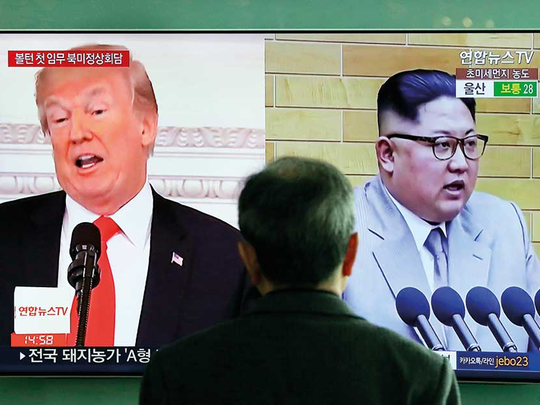
North Korea’s announcement that it is halting nuclear and missile tests in the run up to the first inter-Korean summit in over a decade dominated global headlines this week.
The Asahi Shimbun called the breakthrough ‘radical’ and backed calls for continued dialogue with the hermit nation. “North Korea has declared a radical policy shift by announcing it will immediately suspend tests of nuclear weapons and intercontinental ballistic missiles to pursue peaceful relations with the outside world. Both [South Korea’s President] Moon and [Donald] Trump are considering measures to bring a formal end to the Korean War, which ended with an armistice in 1953 but no actual peace treaty. It is important for Japan to start readying itself for possible negotiations to establish a formal diplomatic relationship with North Korea while keeping pressure on the Kim regime to abandon its nuclear arsenal. Now that Pyongyang has demonstrated its seriousness about pursuing dialogue with the international community, Tokyo should spare no effort to prepare for talks with the country,” the Japanese daily wrote in its editorial.
‘Talking peace is better than threatening war’ was the message from the Guardian. The paper went on to note that Trump professes a zero-sum world view, where concession is weakness. “In relations with North Korea, Trump has promised the country’s dictatorial leader, Kim Jong-un, a gift — the status boost of a summit meeting — while receiving nothing in return. The US president’s combination of wildly aggressive rhetoric and diplomatic concession only confirms that view. It is also plausible that Washington hawks do not seriously expect progress and are itching to declare that dialogue has failed and war is a logical next resort. It is, of course, better that the two sides talk peace than threaten war. It is unclear what the US is getting out of this process and unclear whether, beyond relishing the drama, Trump even knows what he wants,” the newspaper cautioned.
CNN led with a comment piece on the importance of Korean talks. “It is possible to imagine a comprehensive US grand strategy that pressures China to play a more decisive role in helping denuclearise North Korea and offers North Korea a palatable alternative to nuclear weapons. This path would require thinking strategically, supporting and deploying America’s combined diplomatic, economic and military power, embracing the Trans Pacific Partnership, working closely with allies and doing a host of other things the Trump administration has proven incapable of doing. Even with current levels of US strategic incoherence, a collapse of the North Korean regime under the weight of its own brutality and contradictions could change everything and be great news for almost everyone. Hoping for this outcome is just not a strategy. By bumbling into face-to-face talks with Kim, Trump has certainly helped reduce tensions on the Korean peninsula, but the Trump administration has so far done very little to counter North Korea’s nuclear threat. When this becomes clear, today’s feel-good moment will feel more like an awful hangover,” it added.
The Tribune of Australia highlighted the oft-neglected role of Russia in the Korean conundrum. “North Korea opening to diplomatic meetings gives hope that they will attempt to play nice with their neighbours. But their definitive intentions are hard to pinpoint. Russia and North Korea have always had a stable relationship. The Soviet Union once supported the Korean People’s Army during the Korean War and acted as a sister state once it was established. However, once the Soviet Union fell, the North Korean economy was hugely decimated. Support between the two communist nations begun to deteriorate and ever since, their once stable alliance grew thin. Russia may believe that North Korea’s more peaceful approach to recent tensions could favour both nations. If there were to be a break out of war, North Korea would suffer either way. And Russia will be forced to take in refugees, while suffering trade problems with their neighbours,” the paper concluded.




_resources1_16a31069e4e_small.jpg)







